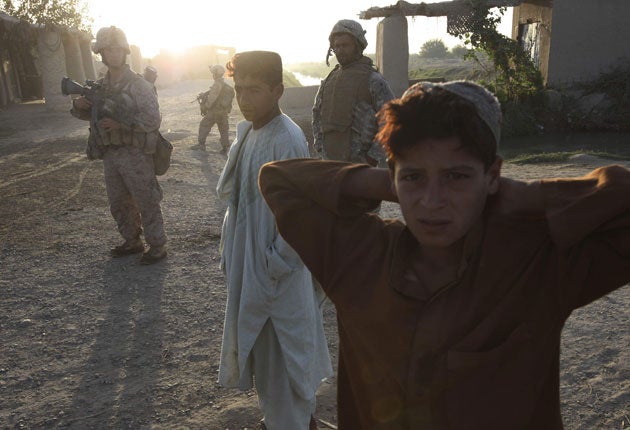In Afghanistan they held a recount, but not many cared
UN warns of more violence to come after revised presidential election results are announced

Your support helps us to tell the story
From reproductive rights to climate change to Big Tech, The Independent is on the ground when the story is developing. Whether it's investigating the financials of Elon Musk's pro-Trump PAC or producing our latest documentary, 'The A Word', which shines a light on the American women fighting for reproductive rights, we know how important it is to parse out the facts from the messaging.
At such a critical moment in US history, we need reporters on the ground. Your donation allows us to keep sending journalists to speak to both sides of the story.
The Independent is trusted by Americans across the entire political spectrum. And unlike many other quality news outlets, we choose not to lock Americans out of our reporting and analysis with paywalls. We believe quality journalism should be available to everyone, paid for by those who can afford it.
Your support makes all the difference.Surveying the dried-up farmland around him, Ghama gave a wry smile when asked what he thought of the government in Afghanistan. In Yatimchay, a remote part of Helmand within touching distance of the Taliban front line, the current row over election fraud is irrelevant to farmers whose greatest concern is bringing in a crop and keeping their children from stumbling on scattered bombs.
This weekend, few in Hamid Karzai's Pashtun heartland seemed too concerned as it became known that a recount had begun of some of the votes cast in the presidential election to assess if he had genuinely secured 54.6 per cent of the vote. Ghama was more vocal. Casting his hand far and wide, he said: "There are no roads, no bridges, not enough water. If you ask people, they will say our government is corrupt: they save money for themselves. They only want to make their lives better. They don't think about the poor people. They don't know what is going on in Helmand."
Traditionally, the inhabitants of Helmand have felt patronised by the more sophisticated population in Kabul. A proud people, they have asked little and received even less from the government. They ask only for security, justice, schooling and health care; and while reconstruction efforts have begun in areas dominated by troops, there is little or no sign of progress elsewhere. The war that rages in their midst has increased their sense of isolation. One British soldier was stunned to discover in early August some locals who were unaware even that there was an election on the 20th of that month.
Yesterday, it was reported that rising violence ahead of the disputed election had made August the deadliest month of the year so far for coaliltion troops and the UN warned that attacks could spike again when the final results are announced. Meanwhile, officials have begun to recount votes from around 12 per cent of the polling stations, and a run-off could be held if voting irregularities are found. The Electoral Complaints Commission has deemed that results from 3,063 polling stations are suspicious because they registered a turnout above 100 per cent or had one candidate receiving nearly all the votes.
In the north of Helmand, the British Battle Group (North West), which covers Musa Qala district, Baghran and part of Kajaki, the population is estimated at around 100,000. Yet only eight polling stations were open and under 10,000 voted – all male – in the pocket of land secured by soldiers. On the edge of Nato control – where the tiny British base of Roshan Tower had to be temporarily evacuated on the day of the elections after the Taliban fired at it – most locals were too terrified to do their civic duty.
In Garmsir, the southernmost point of Helmand now held by US Marines, voters lined up at polling stations within the Isaf-controlled district centre with an estimated 5,000 casting their vote – 80 per cent to Karzai – but, even then, there was confusion. One elder, who turned up on behalf of his village seemed baffled when told he could cast only one vote. Another man was spotted taking his ballot paper and posting it in the box, blissfully unaware that he had to make his mark.
It is to the local governors – rather than the national government – that the people look for signs of progress.
But some, like Musa Qala's governor, Mullah Salaam, a Taliban defector, are not known for civic works. "Ultimately, he is a warlord. He likes to charge around killing people, but sorting out schools and health care is a bit dull and there is no money in it, so he's not interested," said one senior officer.
Join our commenting forum
Join thought-provoking conversations, follow other Independent readers and see their replies
Comments